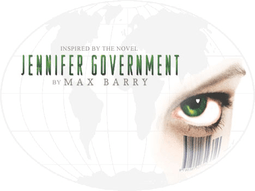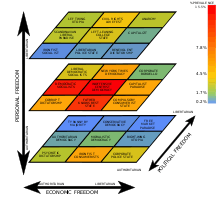NationStates
 | |
Type of site | Government simulation game |
|---|---|
| Owner | Max Barry |
| Created by | Max Barry |
| Revenue | From advertising, paid premium memberships and encouraged book sales |
| Website | nationstates.net |
| Alexa rank |
|
| Commercial | Yes |
| Registration | Yes |
| Launched | 13 November 2002 |
| Current status | Active |
NationStates is a multiplayer government simulation browser game. It was created by Max Barry and was publicly released on 13 November 2002,[2] based loosely on his novel Jennifer Government.[3] Barry founded the site as an independent vehicle publicizing the book one week before its release.[3] The site continues to promote books written by Barry.
Gameplay

Players set up their nation by answering a short questionnaire about their intentions for its economy, civil rights and political freedoms,[4] giving it a name,[5] a flag from current countries and territories or their own, a national animal, a currency, and an official motto.[4] The player's response to the initial questionnaire defines the type of government they are running.[6]
New nations appear in one of five main game regions (known in the game as "feeders") located in the NationStates version of the Pacific Ocean (The East, West, North, and South Pacific), but nations are able to move to other regions, or create their own. Nations that remain inactive and are resurrected are put into three "sinker" regions called Osiris, Balder, and Lazarus, all named after characters that purportedly rose from the dead. Nations ejected or banned from a region are moved to a region known as "The Rejected Realms".
Gameplay hinges on deciding government policies: four times each day the player is presented with an automatically assigned "issue",[6] such as choosing whether to allow a right-wing protest march, or dealing with food shortages in their country.[4] The player chooses a government stance from a list of options, or may choose to dismiss the problem. Each action or inaction affects the prosperity of the player's country, and may have unforeseen effects. For instance, granting greater political freedom may lead to more civil unrest.[4] Some issues are written by the game's developers, while others are submitted by players. For the first 30 days of a nation's existence, only game-created issues can be answered, but after that period any approved issue can be answered.[6] The player's responses to issues affect the nation's status in three main factors: the level of Political Freedoms and Civil Rights and the strength of the Economy.[6] As of March 24, 2016, users have developed 500 issues to be used in game.[7]

Based on the nation's personal, economic and political freedoms, the nation is assigned to one of 27 government types,[6] from Anarchy, to Inoffensive Centrist Democracy, to Psychotic Dictatorship. Although there is no way of "winning" the game, daily "World Census reports" are compiled for each region and the entire world, ranking nations on anything from economic strength to the most liberal public nudity laws.[6]
Outside the basic technical parameters of nation play, players can also move freely between regions, "take over" opposing regions by flooding them with foreign nations (a popular gameplay tactic also called "raiding"), interact on the game's chat boards, vote on resolutions at the World Assembly (which affect member nations' stats much the same way issues do), and chat and/or roleplay their countries on the official game forums. Many of the regions also have separate regional forums that concern regional politics, fairs, etc.
Popularity
The game attracted a thousand nations within two weeks, and had 20,700 by the end of the first year.[4] Barry was surprised by the popularity of the game, and saw its discussion forums developing into an arena for political debate.[4] He was impressed by some of the activity in the forums, relating how "One nation accused another of conducting secret missile tests and posted photos to prove it. That escalated into an international crisis that was only solved by sending in teams of independent weapons inspectors".[3]
On April 21, 2016, NationStates had around 190,000+[8] active nations, and 4.25 million inactive, no longer existing, or defunct nations.
United Nations incident
In 2008, Barry received a cease and desist order from the United Nations for using the UN name and logo for the international ruling body on the website. In response, he removed the logo and changed the name to the World Assembly.[9]
NationStates 2
In 2008, OMAC Industries purchased Jolt Gaming and announced plans for a "big release" sequel that summer, NationStates 2.[10] In February 2009, Max Barry announced that NationStates was leaving the OMAC Industries servers and game system, and that the game "doesn't have terribly much to do with [NationStates 2] any more."[11] He also stated in a YouTube FAQ video that the developer had not taken time to develop the game thoroughly, and was planning to develop the game further after its release. This was not something Max Barry had in mind. Nationstates 2 was closed down in 2009,[12] and Jolt Gaming shut down in 2012.
See also
References
- ↑ "Nationstates.net Site Info". Alexa Internet. Retrieved 2016-03-01.
- ↑ nationstates.net: History, accessdate: 10 April 2014
- 1 2 3 O'Connell, Pamela Licalzi (16 January 2003). "ONLINE DIARY". The New York Times. p. 3. Retrieved 30 June 2011.
- 1 2 3 4 5 6 Goldman, Noah. "A Web Site of Virtual Nations". ABC News. Retrieved 10 April 2014.
- ↑ "Virtual nations take control over the cyber world - Economic Times". The Economic Times. 12 September 2006. Retrieved 30 June 2011.
- 1 2 3 4 5 6 Christa Sommerer; L. C. Jain; Laurent Mignonneau (2008). The Art and Science of Interface and Interaction Design. Springer. p. 173. ISBN 354079869-2.
- ↑ "NationStates | News". www.nationstates.net. Retrieved 2016-03-29.
- ↑ Barry, Max. "World Census Update". NationStates. Retrieved 4 March 2016.
- ↑ The United Nations vs Me, retrieved 17 May 2014.
- ↑ Phil Elliott (2008-06-18). "OMAC Industries acquires Jolt Online Gaming | GamesIndustry International". Gamesindustry.biz. Retrieved 2013-01-06.
- ↑ Barry, Max (2009-02-25). "We're indy, baby". NationStates.net. Retrieved 2009-04-02.
- ↑ "NationStates 2".